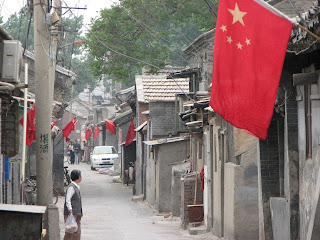Another day, another session of the budget committee, with the opposition once again raking the Abe Cabinet over the coa...by which I mean soberly discussing Japan's policy goals and requirements.
As such, I want to take a brief break from tracking the current Diet session to post some notes on a book I recently finished reading.
But first, I now have a dedicated email address for questions and comments concerning the content of this blog. Please direct your email to
observingjapan@gmail.com.
As longtime readers of this blog will note, I have a particular fascination with China (er, who -- especially among observers of the Asia-Pacific -- doesn't these days). In any case, I have been reading as many books worth reading on China that I can get my hands on in order to get a more nuanced view of the country that may claim the twenty-first century in the same way that America claimed the twentieth. (Find a previous review
here.)
In this vein, I have just finished reading journalist Ian Buruma's
Bad Elements, in which he travels the Chinese world, from the suburbs of Washington, DC to Tibet, to talk with prominent and not-so-prominent Chinese dissidents, including dissidents who have resisted governments in Taipei and Singapore. While already several years old, Buruma provides a thorough look at the dynamics of resistance from which the successful removal of the CCP might spring. At the same time, however, Buruma should be credited for not writing hagiography. It is altogether too easy to lose one's critical eye when assessing individuals who have risked everything to resist tyrannical governments, and while Buruma gives the subjects of his book the credit they deserve, he doesn't not hesitate in his probing of their motives and their goals.
I drew several especially salient points from Buruma's book.
First, there is no question that the CCP will fall sooner or later. Having unleashed the tremendous forces of a modern market economy without having relinquished power, the CCP cleared the way for rampant corruption -- while at the same time ever so slightly giving citizens space to begin demanding accountability (how else does one explain
this). The question is how long before demands for accountability metastasize into demands for greater political accountability. Buruma's frequent references to Chinese history -- which is filled with examples of long-ruling regimes overturned -- serve as a constant reminder that sooner or later each regime that has governed China has faltered and fallen, usually overwhelmed by systemic failures and flaws. The timeline at work in the demise of the CCP regime may not conform to the demands of the twenty-four news cycle, but the forces that will cause its downfall are already at work, and they were unleashed by the CCP itself when it opted for vast liberalization. (For a look at how this might happen, I strongly recommend Bruce Gilley's
China's Democratic Future.)
Second -- this is a more philosophical point -- Buruma was surprised to find that many of the exiled dissidents with whom he talked converted to Christianity while in exile, which suggests that no matter how hard materialists like the CCP try to extinguish the human soul, that deep need to believe in something greater than oneself, it finds a way of re-emerging, often as religious belief. I suspect that the cadres in Beijing realize this, hence the promotion of nationalism in the wake of Deng's reforms.
Speaking of nationalism, Buruma expertly documents the twisted skein that is Chinese nationalism in the twenty-first century: sometimes racialist, sometimes cultural, sometimes political, often belligerent, the impact Chinese nationalism will have on the political and social evolution of China in the coming decades is probably the greatest wild card at present.
One final point that I found interesting is that in contemporary China, as in Eastern Europe during the 1970s and 1980s, when the ruling party has politicized everything, the act of carving out a place for the non-political in society becomes, paradoxically, imbued with great political significance (This phenomenon was deftly described in Tony Judt's
Postwar).
I can very easily imagine research institutes in Beijing full of newly minted Chinese PhDs digging through the history of the demise of the Eastern bloc -- not to mention Chinese history -- looking for clues to avoid the same fate as the "people's democracies."
In any case, I give credit to Buruma for not simply writing a book that cheers China's dissidents and looks to post-CCP China with rose-tinted glasses. China's democratic transition, when it comes, is bound to be a messy and potentially bloody affair, and Buruma successfully treads the thin line between realistically assessing the future and worshipping the present power on the throne in Beijing. The picture that emerges from his account is of a China that's more than ready for a change, thanks to a population more politically astute than observers often suggest.

